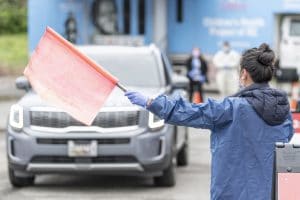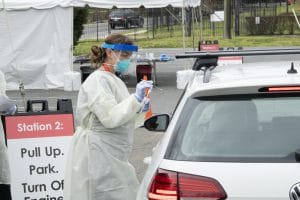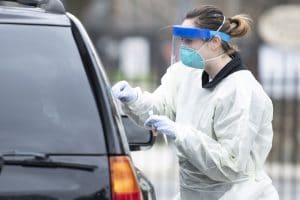Months after the coronavirus pandemic reached U.S. shores, barely 1% of Americans have been tested for COVID-19, the disease caused by the virus. So, Hyundai is stepping up funding aimed at expanding field testing, doubling the financial support it is providing to 22 hospitals across the country.
The South Korean carmaker’s U.S. subsidiary, Hyundai Motor America, has doubled, to $4 million, the grants it is providing for COVID-19 drive-thru testing as part of its Hyundai Hope on Wheels program. It also plans to supply 65,000 test kits developed by Seegene, a South Korean molecular diagnostics firm. The tests can simultaneously detect three different genes of the SARS-CoV-2 virus, reducing the likelihood of false results.
“As a global automaker, we continue to monitor the COVID-19 situation and its potential harm to the U.S. and beyond,” said Jose Muñoz, president and CEO of Hyundai Motor North America. “A best practice that was crucial in South Korea’s handling of the coronavirus was drive-thru testing. This approach protects the healthcare workers and patients from the potential spread of the virus, while diagnosing those most in need.”
(GM ready to ship first round of new emergency ventilators.)
Automakers like Hyundai, as well as Detroit’s General Motors, Ford and Fiat Chrysler have become active players in what is being dubbed the “Arsenal of Health,” a riff on the World War II-era “Arsenal of Democracy” that helped power America’s war machine.
On Monday, Ford offered an update on its own program. The automaker is partnering with several medical supply companies to address critical shortages across the country. With 3M, for example, it will start producing powered respirators starting later this week. Ford also is producing other personal protection equipment, or PPE, such as face shields, masks, and gowns, the latter using nylon fabric normally used for airbags.
GM is now rolling out ventilators, used to assist the most critically ill of COVID-19 victims, as part of a partnership with Ventec Life Systems. It’s also producing medical-grade masks, as is Fiat Chrysler.
(Ford expanding medical gear production in alliance with 3M.)
Volkswagen, Daimler and other automakers have also fired up production of various PPEs in the U.S. and abroad. Shortages of these devices have exposed medical personnel to grave risk while also making it more difficult to treat patients stricken with COVID-19.

The South Korean automaker also plans to supply 65,000 test kits developed by Seegene, a South Korean molecular diagnostics firm.
Hyundai Motor America is addressing one of the other shortages slowing the U.S. response to the pandemic: a lack of testing equipment. In terms of raw numbers, the U.S. has tested more than 3 million citizens so far but, on a per capita basis that seriously lags behind a number of other countries, such as South Korea, which have been able to minimize the spread of the pandemic.
To date, barely 1% of the American population has been tested to find those infected by the disease – with testing to find out who might have previously been infected is just beginning.
One of the most serious problems with SARS-CoV-2 is that its effects vary widely. While it is believed to be killing about 3% of those infected in the U.S. – with the numbers varying widely in different countries – many victims are asymptomatic. Without testing they likely won’t know that they are “shedding” the virus, quickly infecting others with whom they have contact with.
(Hyundai extends warranties; automakers look to help owners.)
“By supporting testing, Hyundai has stepped up as a global leader to provide an invaluable resource that will serve impacted Americans at this most critical time while also assisting to prevent further spread of the virus,” said Dr. Helen Cha Roberts, president, Seegene Technologies.


